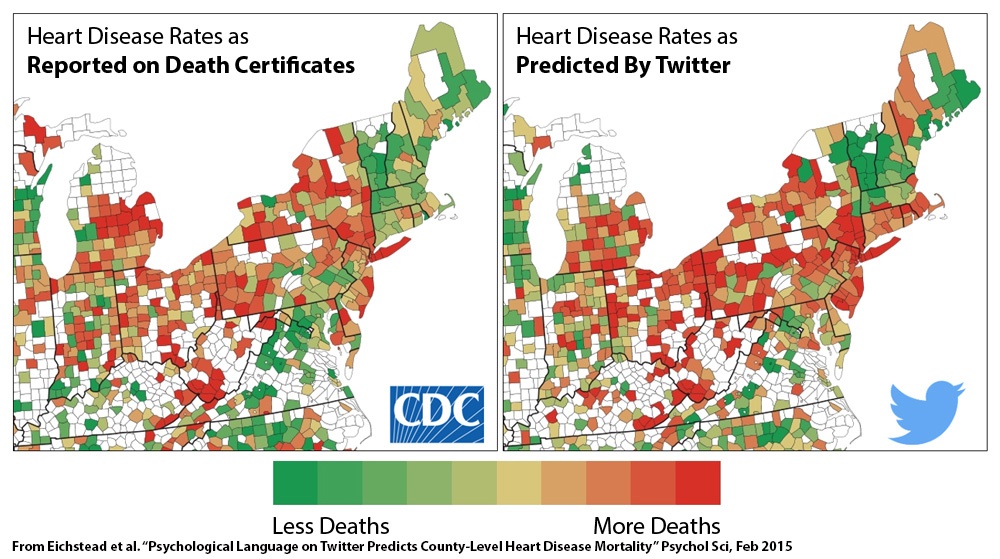This amazing study published in 20151, demonstrated that heart disease rates in a community could be predicted quite well just by looking at how positively or negatively people were expressing themselves toward others. Using anonymous data analysis, millions of Twitter phrases were used to measure the degree of positivity and negativity expressed in various counties throughout the U.S. Researchers looked for expressions of anger, frustration, and discontent, as well as expressions of happiness, and positivity. For example, the frequency of phrases that included angry curse words was particularly predictive of high rates of heart disease deaths in the same community. On the other hand, high rates of positive or optimistic phrases or words, such as “great” or “wonderful”, predicted lower death rates.
This “community attitude rating” as I will call it, was such a strong predictor of heart disease death rates, that it outperformed any other prediction measure the researchers could find. Regardless of the mix of age, ethnicity, gender, income, education or other demographics, the “community attitude rating” was the clear winner. Twitter language was even more predictive of heart disease death rates than rates of health problems such as diabetes, high blood pressure, or obesity in a community.
What is going on here! Does cursing cause heart disease? No—cursing does not cause heart disease. However I believe something very important is going on that affects the arteries—something you can understand to help protect yourself from heart disease.
In my view, a key message emerging from this study and others, is that POSITIVE ATTITUDE—a potent force within your control—can help shield your arteries from the damaging effects of life’s challenges. Everybody faces challenges every day. Whether you’re dealing with heavy traffic, bad news, bad weather, mean bosses, unpleasant neighbors, cheaters, busy schedules, needy family members, etc.—we all face a combination of small, medium, and large attitude busters. We all face the challenges created by a world full of unhealthy delicious food, and barriers to getting more exercise. My specific set of problems might not exactly match your problems, and vice versa, but I guarantee we all face the potential threat of leading an unhappy and unhealthy life. Money does not buy happiness or protect us from unhappiness—positive attitude does!
Reacting negatively rather than positively to life’s challenges apparently damages the arteries throughout the body, leading to heart disease and premature death. Your reactions and attitude affect the tension of blood vessels and levels of stress hormones seen by the arteries on a minute-to-minute basis. Your arteries “know” your mental state, and they want you to be positive and happy rather than stressed out and negative.
It is important to note that in the Twitter study, the people “Tweeting” were not the ones who were dying. The people who died of heart disease were generally over age 60 and had possibly never heard of Twitter. But too many of them lived in communities where negativity was rampant during the past decades. Today’s Twitter feeds unveil a measure of ongoing challenges that have been slowly killing people for decades. Similarly, in the decades ahead, people of all ages will continue to accumulate plaque and heart risk at a rate that mirrors their attitude. But this is something you can control. You might not be able to change the attitude of your neighbors, but you can seek out positive communities, positive friends, and cultivate a positive attitude yourself. You can create a household where the food is healthy, exercise is ensured, and attitudes are positive.
This quote from a young man whose parents abandoned him at age 15 during the Great Depression sums it up nicely: “It takes energy to get angry. It eats you up inside. I can’t waste my energy like that and expect to get ahead.” Joe Rantz—Olympic gold medalist 1936 Crew (from The Boys in The Boat by Daniel James Brown). I challenge you to adopt the attitude of an Olympian (rather than a victim), no matter what life throws at you in the years and decades ahead!
References:
- https://www.ncbi.nlm.nih.gov/pmc/articles/PMC4433545/
